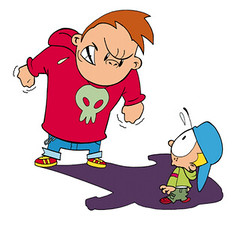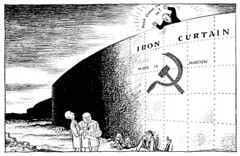| 7142793402 | ALLITERATION | repetition of the same or similar consonant sounds in words that are close together.
EXAMPLE: "When the two youths turned with the flag they saw that much of the regiment had crumbled away, and the dejected remnant was coming slowly back." -Stephen Crane (Note how regiment and remnant are being used; the regiment is gone, a remnant remains...) | | 0 |
| 7142793403 | ALLUSION | reference to someone or something that is known from history, literature, religion, politics, sports, science, or another branch of culture. An indirect reference to something (usually from literature, etc.). | | 1 |
| 7142793404 | AMBIGUITY | deliberately suggesting two or more different, and sometimes conflicting, meanings in a work. An event or situation that may be interpreted in more than one way- - this is done on purpose by the author, when it is not done on purpose, it is vagueness, and detracts from the work. | | 2 |
| 7142793405 | ANALOGY | Comparison made between two things to show how they are alike | | 3 |
| 7142793406 | ANAPHORA | Repetition of a word, phrase, or clause at the beginning of two or more sentences in a row. This is a deliberate form of repetition and helps make the writer's point more coherent. | | 4 |
| 7142793407 | ANASTROPHE | Inversion of the usual, normal, or logical order of the parts of a sentence. Purpose is rhythm or emphasis or euphony. It is a fancy word for inversion. | | 5 |
| 7142793408 | ANECDOTE | Brief story, told to illustrate a point or serve as an example of something, often shows character of an individual | | 6 |
| 7142793409 | ANTAGONIST | Opponent who struggles against or blocks the hero, or protagonist, in a story. | | 7 |
| 7142793410 | ANTIMETABOLE | Balancing words, phrases, or ideas that are strongly contrasted, often by means of grammatical structure. | | 8 |
| 7142793411 | ANTIHERO | Central character who lacks all the qualities traditionally associated with heroes. may lack courage, grace, intelligence, or moral scruples. | | 9 |
| 7142793412 | ANTHROPOMORPHISM | Attributing human characteristics to an animal or inanimate object (Personification) | | 10 |
| 7142793413 | APHORISM | Brief, cleverly worded statement that makes a wise observation about life, or of a principle or accepted general truth. Also called maxim, epigram. | | 11 |
| 7142793414 | APOSTROPHE | Calling out to an imaginary, dead, or absent person, or to a place or thing, or a personified abstract idea. If the character is asking a god or goddess for inspiration it is called an invocation.
Josiah Holland ---"Loacöon! Thou great embodiment/ Of human life and human history!" | | 12 |
| 7142793415 | APPOSITION | Placing in immediately succeeding order of two or more coordinate elements, the latter of which is an explanation, qualification, or modification of the first (often set off by a colon). Paine: "These are the times that try men's souls: The summer soldier and the sunshine patriot will in this crisis, shrink from the service of his country; but he that stands it Now, deserves the love and thanks of man and woman." | | 13 |
| 7142793416 | ASSONANCE | The repetition of similar vowel sounds followed by different consonant sounds especially in words that are together. | | 14 |
| 7142793417 | ASYNDETON | Commas used without conjunction to separate a series of words, thus emphasizing the parts equally: instead of X, Y, and Z... the writer uses X,Y,Z.... see polysyndeton. | | 15 |
| 7142793418 | BALANCE | Constructing a sentence so that both halves are about the same length and importance. Sentences can be unbalanced to serve a special effect as well. | | 16 |
| 7142793419 | CHARACTERIZATION | The process by which the writer reveals the personality of a character. | | 17 |
| 7142793420 | INDIRECT CHARACTERIZATION | The author reveals to the reader what the character is like by describing how the character looks and dresses, by letting the reader hear what the character says, by revealing the character's private thoughts and feelings, by revealing the characters effect on other people (showing how other characters feel or behave toward the character), or by showing the character in action. Common in modern literature | | 18 |
| 7142793421 | DIRECT CHARACTERIZATION | The author tells us directly what the character is like: sneaky, generous, mean to pets and so on. Romantic style literature relied more heavily on this form. | | 19 |
| 7142793422 | STATIC CHARACTER | Is one who does not change much in the course of a story. | | 20 |
| 7142793423 | DYNAMIC CHARACTER | Is one who changes in some important way as a result of the story's action. | | 21 |
| 7142793424 | FLAT CHARACTER | has only one or two personality traits. They are one dimensional, like a piece of cardboard. They can be summed up in one phrase. | | 22 |
| 7142793425 | ROUND CHARACTER | has more dimensions to their personalities---they are complex, just a real people are. | | 23 |
| 7142793426 | CHIASMUS | In poetry, a type of rhetorical balance in which the second part is syntactically balanced against the first, but with the parts reversed. Coleridge: "Flowers are lovely, love is flowerlike." In prose this is called antimetabole. | | 24 |
| 7142793427 | CLICHE | Is a word or phrase, often a figure of speech, that has become lifeless because of overuse. Avoid clichés like the plague. (That cliché is intended.) | | 25 |
| 7142793428 | COLLOQUIALISM | A word or phrase in everyday use in conversation and informal writing but is inappropriate for formal situations.
Example: "He's out of his head if he thinks I'm gonna go for such a stupid idea. | | 26 |
| 7142793429 | COMEDY | In general, a story that ends with a happy resolution of the conflicts faced by the main character or characters. | | 27 |
| 7142793430 | CONCEIT | An elaborate metaphor that compares two things that are startlingly different. Often an extended metaphor. | | 28 |
| 7142793431 | CONFESSIONAL POETRY | A twentieth century term used to describe poetry that uses intimate material from the poet's life. | | 29 |
| 7142793432 | CONFLICT | The struggle between opposing forces or characters in a story. | | 30 |
| 7142793433 | EXTERNAL CONFLICT | Conflicts can exist between two people, between a
person and nature or a machine or between a person a whole society. | | 31 |
| 7142793434 | INTERNAL CONFLICT | A conflict can be internal, involving opposing forces within a person's mind. | | 32 |
| 7142793435 | CONNOTATION | The associations and emotional overtones that have become attached to a word or phrase, in addition to its strict dictionary definition. | | 33 |
| 7142793436 | COUPLET | Two consecutive rhyming lines of poetry. | | 34 |
| 7142793437 | DIALECT | A way of speaking that is characteristic of a certain social group or of the
inhabitants of a certain geographical area. | | 35 |
| 7142793438 | DICTION | A speaker or writer's choice of words. | | 36 |
| 7142793439 | DIDACTIC | Form of fiction or nonfiction that teaches a specific lesson or moral or
provides a model of correct behavior or thinking. | | 37 |
| 7142793440 | ELEGY | A poem of mourning, usually about someone who has died. A Eulogy is great praise or commendation, a laudatory speech, often about someone who has died. | | 38 |
| 7142793441 | EPANALEPSIS | Device of repetition in which the same expression (single word or phrase) is repeated both at the beginning and at the end of the line, clause, or sentence. Voltaire: "Common sense is not so common." | | 39 |
| 7142793442 | EPANALEPSIS | device of repetition in which the same expression (single word or phrase) is repeated both at the beginning and at the end of the line, clause, or sentence. Voltaire: "Common sense is not so common." | | 40 |
| 7142793443 | EPIC | A long narrative poem, written in heightened language , which recounts the deeds of a heroic character who embodies the values of a particular society. | | 41 |
| 7142793444 | EPIGRAPH | A quotation or aphorism at the beginning of a literary work suggestive of the theme. | | 42 |
| 7142793445 | EPISTROPHE | Device of repetition in which the same expression (single word or phrase) is repeated at the end of two or more lines, clauses, or sentences (it is the opposite of anaphora). | | 43 |
| 7142793446 | EPITHET | An adjective or adjective phrase applied to a person or thing that is frequently used to emphasize a characteristic quality. "Father of our country" and "the great Emancipator" are examples. A Homeric epithet is a compound adjective used with a person or thing: "swift-footed Achilles"; "rosy-fingered dawn." | | 44 |
| 7142793447 | ESSAY | A short piece of nonfiction prose in which the writer discusses some aspect of a subject. | | 45 |
| 7142793448 | ESSAY: ARGUMENTATION | One of the four forms of discourse which uses logic, ethics, and emotional appeals (logos, ethos, pathos) to develop an effective means to convince the reader to think or act in a certain way. | | 46 |
| 7142793449 | ESSAY: PERSUASION | Relies more on emotional appeals than on facts | | 47 |
| 7142793450 | ESSAY: ARGUMENT | Form of persuasion that appeals to reason instead of
emotion to convince an audience to think or act in a certain way. | | 48 |
| 7142793451 | ESSAY: CAUSAL RELATIONSHIP | Form of argumentation in which the writer claims that one thing results from another, often used as part of a logical argument. | | 49 |
| 7142793452 | ESSAY: DESCRIPTION | A form of discourse that uses language to create a mood or emotion. | | 50 |
| 7142793453 | ESSAY: EXPOSITION | One of the four major forms of discourse, in which something is explained or "set forth." | | 51 |
| 7142793454 | ESSAY: NARRATIVE | The form of discourse that tells about a series of events. | | 52 |
| 7142793455 | EXPLICATION | Act of interpreting or discovering the meaning of a text, usually involves close reading and special attention to figurative language. | | 53 |
| 7142793456 | FABLE | A very short story told in prose or poetry that teaches a practical lesson about how to succeed in life. | | 54 |
| 7142793457 | FARCE | A type of comedy in which ridiculous and often stereotyped characters are involved in silly, far-fetched situations. | | 55 |
| 7142793458 | FIGURATIVE LANGUAGE | Words which are inaccurate if interpreted literally, but are used to describe. Similes and metaphors are common forms. | | 56 |
| 7142793459 | FLASHBACK | A scene that interrupts the normal chronological sequence of events in a story to depict something that happened at an earlier time. | | 57 |
| 7142793460 | FOIL | A character who acts as contrast to another character. Often a funny side kick to the dashing hero, or a villain contrasting the hero. | | 58 |
| 7142793461 | FORESHADOWING | The use of hints and clues to suggest what will happen later in a plot. | | 59 |
| 7142793462 | FREE VERSE | Poetry that does not conform to a regular meter or rhyme scheme. | | 60 |
| 7142793463 | HYPERBOLE | A figure of speech that uses an incredible exaggeration or overstatement,
for effect. "If I told you once, I've told you a million times...." | | 61 |
| 7142793464 | HYPOTACTIC | Sentence marked by the use of connecting words between clauses or sentences, explicitly showing the logical or other relationships between them. (Use of such syntactic subordination of just one clause to another is known as hypotaxis).
I am tired because it is hot. | | 62 |
| 7142793465 | IMAGERY | The use of language to evoke a picture or a concrete sensation of a person , a thing, a place, or an experience. | | 63 |
| 7142793466 | INVERSION | The reversal of the normal word order in a sentence or phrase. | | 64 |
| 7142793467 | IRONY | A discrepancy between appearances and reality. | | 65 |
| 7142793468 | VERBAL IRONY | Occurs when someone says one thing but really means something else. | | 66 |
| 7142793469 | SITUATIONAL IRONY | Takes place when there is a discrepancy between what is expected to happen, or what would be appropriate to happen, and what really does happen. | | 67 |
| 7142793470 | DRAMATIC IRONY | Is so called because it is often used on stage. A character in the play or story thinks one thing is true, but the audience or reader knows better. | | 68 |
| 7142793471 | JUXTAPOSITION | Poetic and rhetorical device in which normally unassociated ideas, words, or phrases are placed next to one another, creating an effect of surprise and wit. Ezra Pound: "The apparition of these faces in the crowd;/ Petals on a wet, black bough."
Juxtaposition is also a form of contrast by which writers call attention to
dissimilar ideas or images or metaphors.
Martin Luther King: "Injustice anywhere is a threat to justice everywhere." | | 69 |
| 7142793472 | LITOTES | Is a form of understatement in which the positive form is emphasized through the negation of a negative form: Hawthorne--- "...the wearers of petticoat and farthingale...stepping forth into the public ways, and wedging their not unsubstantial persons, if occasion were, into the throng..." | | 70 |
| 7142793473 | LOCAL COLOR | A term applied to fiction or poetry which tends to place special emphasis on a particular setting, including its customs, clothing, dialect and landscape. | | 71 |
| 7142793474 | LOOSE SENTENCE | One in which the main clause comes first, followed by further dependent grammatical units. See periodic sentence.
Hawthorne: "Hester gazed after him a little while, looking with a half-fantastic curiosity to see whether the tender grass of early spring would not be blighted beneath him, and show the wavering track of this footsteps, sere and brown, across its cheerful verdure." | | 72 |
| 7142793475 | LYRIC POEM | A poem that does not tell a story but expresses the personal feelings or thoughts of the speaker. A ballad tells a story. | | 73 |
| 7142793476 | METAPHOR | a figure of speech that makes a comparison between two unlike things without the use of such specific words of comparison as like, as, than, or resembles. | | 74 |
| 7142793477 | IMPLIED METAPHOR | does not state explicitly the two terms of the comparison: "I like to see it lap the miles" is an implied metaphor in which the verb lap implies a comparison between "it" and some animal that "laps" up water. | | 75 |
| 7142793478 | EXTENDED METAPHOR | is a metaphor that is extended or developed as far as the writer wants to take it. (conceit if it is quite elaborate). | | 76 |
| 7142793479 | DEAD METAPHOR | is a metaphor that has been used so often that the comparison is no longer vivid: "The head of the house", "the seat of the government", "a knotty problem" are all dead metaphors. | | 77 |
| 7142793480 | MIXED METAPHOR | is a metaphor that has gotten out of control and mixes its terms so that they are visually or imaginatively incompatible. "The President is a lame duck who is running out of gas." | | 78 |
| 7142793481 | METONYMY | a figure of speech in which a person, place, or thing, is referred to by something closely associated with it. "We requested from the crown support for our petition." The crown is used to represent the monarch. | | 79 |
| 7142793482 | MOOD | An atmosphere created by a writer's diction and the details selected. | | 80 |
| 7142793483 | MOTIF | a recurring image, word, phrase, action, idea, object, or situation used throughout a work (or in several works by one author), unifying the work by tying the current situation to previous ones, or new ideas to the theme. Kurt Vonnegut uses "So it goes" throughout Slaughterhouse-Five to remind the reader of the senselessness of death. | | 81 |
| 7142793484 | MOTIVATION | the reasons for a character's behavior. | | 82 |
| 7142793485 | ONOMATOPOEIA | the use of words whose sounds echo their sense. "Pop." "Zap." | | 83 |
| 7142793486 | OXYMORON | a figure of speech that combines opposite or contradictory terms in a brief phrase. "Jumbo shrimp." "Pretty ugly." "Bitter-sweet" | | 84 |
| 7142793487 | PARABLE | a relatively short story that teaches a moral, or lesson about how to lead a good life. | | 85 |
| 7142793488 | PARADOX | a statement that appears self-contradictory, but that reveals a kind of truth. | | 86 |
| 7142793489 | KOAN | is a paradox used in Zen Buddhism to gain intuitive knowledge: "What is
the sound of one hand clapping?" | | 87 |
| 7142793490 | PARALLEL STRUCTURE | (parallelism) the repetition of words or phrases that have similar grammatical structures. | | 88 |
| 7142793491 | PARATACTIC SENTENCE | simply juxtaposes clauses or sentences. I am tired: it is hot. | | 89 |
| 7142793492 | PARODY | a work that makes fun of another work by imitating some aspect of the writer's style. | | 90 |
| 7142793493 | PERIODIC | sentence that places the main idea or central complete thought at the end of the sentence, after all introductory elements. | | 91 |
| 7142793494 | PERSONIFICATION | a figure of speech in which an object or animal is given human feelings, thoughts, or attitudes. | | 92 |
| 7142793495 | PLOT | the series of related events in a story or play, sometimes called the storyline. | | 93 |
| 7142793496 | EXPOSITION | introduces characters, situation, and setting | | 94 |
| 7142793497 | RISING ACTION | complications in conflict and situations (may introduce new
ones as well) | | 95 |
| 7142793498 | CLIMAX | that point in a plot that creates the greatest intensity, suspense, or interest. Also called "turning point" | | 96 |
| 7142793499 | RESOLUTION | the conclusion of a story, when all or most of the conflicts have been settled; often called the denouement. | | 97 |
| 7142793500 | POINT OF VIEW | the vantage point from which the writer tells the story. | | 98 |
| 7142793501 | FIRST PERSON POINT OF VIEW | one of the characters tells the story. | | 99 |
| 7142793502 | THIRD PERSON POINT OF VIEW | an unknown narrator, tells the story, but this narrator zooms in to focus on the thoughts and feelings of only one character. | | 100 |
| 7142793503 | OMNISCIENT POINT OF VIEW | an omniscient or all knowing narrator tells the story, also using the third person pronouns. This narrator, instead of focusing on one character only, often tells us everything about many characters. | | 101 |
| 7142793504 | OBJECTIVE POINT OF VIEW | a narrator who is totally impersonal and objective tells the story, with no comment on any characters or events. | | 102 |
| 7142793505 | POLYSYNDETON | sentence which uses a conjunction with NO commas to separate the items in a series. Instead of X, Y, and Z... Polysyndeton results in X and Y and Z... Kurt Vonnegut uses this device. | | 103 |
| 7142793506 | PROTAGONIST | the central character in a story, the one who initiates or drives the action. Usually the hero or anti-hero; in a tragic hero, like John Proctor of The Crucible, there is always a hamartia, or tragic flaw in his character which will lead to his downfall. | | 104 |
| 7142793507 | PUN | a "play on words" based on the multiple meanings of a single word or on words that sound alike but mean different things. | | 105 |
| 7142793508 | QUATRAIN | a poem consisting of four lines, or four lines of a poem that can be considered as a unit.
REFRAIN a word, phrase, line, or group of li | | 106 |
| 7142793509 | REFRAIN | a word, phrase, line, or group of lines that is repeated, for effect, several times in a poem. | | 107 |
| 7142793510 | RHYTHM | a rise and fall of the voice produced by the alternation of stressed and unstressed syllables in language. | | 108 |
| 7142793511 | RHETORIC | Art of effective communication, especially persuasive discourse. | | 109 |
| 7142793512 | RHETORICAL QUESTION | a question asked for an effect, and not actually requiring
an answer. | | 110 |
| 7142793513 | ROMANCE | in general, a story in which an idealized hero or heroine undertakes a quest and is successful. | | 111 |
| 7142793514 | SATIRE | a type of writing that ridicules the shortcomings of people or institutions in an attempt to bring about a change. | | 112 |
| 7142793515 | SIMILE | a figure of speech that makes an explicitly comparison between two unlike things, using words such as like, as , than, or resembles. | | 113 |
| 7142793516 | SOLILOQUY | a long speech made by a character in a play while no other characters are on stage. | | 114 |
| 7142793517 | STEREOTYPE | a fixed idea or conception of a character or an idea which does not allow for any individuality, often based on religious, social, or racial prejudices. | | 115 |
| 7142793518 | STREAM OF CONSCIOUSNESS | a style of writing that portrays the inner (often chaotic) workings of a character's mind. | | 116 |
| 7142793519 | STYLE | the distinctive way in which a writer uses language: a writer's distinctive use of diction, tone, and syntax. | | 117 |
| 7142793520 | SUSPENSE | a feeling of uncertainty and curiosity about what will happen next in a story. | | 118 |
| 7142793521 | SYMBOL | a person, place, thing, or event that has meaning in itself and that also stands for something more than itself. | | 119 |
| 7142793522 | SYNECDOCHE | a figure of speech in which a part represents the whole. "If you don't drive properly, you will lose your wheels." The wheels represent the entire car. | | 120 |
| 7142793523 | SYNTACTIC FLUENCY | Ability to create a variety of sentence structures, appropriately complex and/or simple and varied in length. | | 121 |
| 7142793524 | SYNTACTIC PERMUTATION | Sentence structures that are extraordinarily complex and involved. Often difficult for a reader to follow. | | 122 |
| 7142793525 | TALL TALE | an outrageously exaggerated, humorous story that is obviously unbelievable. | | 123 |
| 7142793526 | TELEGRAPHIC SENTENCE | A sentence shorter than five words in length. | | 124 |
| 7142793527 | THEME | the insight about human life that is revealed in a literary work. | | 125 |
| 7142793528 | TONE | the attitude a writer takes toward the subject of a work, the characters in it, or the audience, revealed through diction, figurative language, and organization. | | 126 |
| 7142793529 | TRAGEDY | in general, a story in which a heroic character either dies or comes to some other unhappy end. | | 127 |
| 7142793530 | TRICOLON | Sentence of three parts of equal importance and length, usually three independent clauses. | | 128 |
| 7142793531 | UNDERSTATEMENT | a statement that says less than what is meant.
Example: During the second war with Iraq, American troops complained of a fierce sand storm that made even the night-vision equipment useless. A British commando commented about the storm: "It's a bit breezy." | | 129 |
| 7142793532 | UNITY | Unified parts of the writing are related to one central idea or organizing principle. Unity is dependent upon coherence. | | 130 |
| 7142793533 | VERNACULAR | the language spoken by the people who live in a particular locality. | | 131 |
| 7142793534 | IMPRESSIONISM | a nineteenth-century movement in literature and art which advocated a recording of the artist's personal impressions of the world, rather than a strict representation of reality. | | 132 |
| 7142793535 | MODERNISM | a term for the bold new experimental styles and forms that swept the arts during the first third of the twentieth century. | | 133 |
| 7142793536 | NATURALISM | a nineteenth century literary movement that was an extension of realism and that claimed to portray life exactly as it was. | | 134 |
| 7142793537 | PLAIN STYLE | Writing style that stresses simplicity and clarity of expression (but will still utilize allusions and metaphors), and was the main form of the Puritan writers. | | 135 |
| 7142793538 | PURITANISM | Writing style of America's early English-speaking colonists. emphasizes obedience to God and consists mainly of journals, sermons, and poems. | | 136 |
| 7142793539 | RATIONALISM | a movement that began in Europe in the seventeenth century, which held that we can arrive at truth by using our reason rather than relying on the authority of the past, on the authority of the Church, or an institution. ALSO CALLED NEOCLASSICISM AND AGE OF REASON | | 137 |
| 7142793540 | REALISM | a style of writing, developed in the nineteenth century, that attempts to depict life accurately without idealizing or romanticizing it. | | 138 |
| 7142793541 | REGIONALISM | literature that emphasizes a specific geographic setting and that reproduces the speech, behavior, and attitudes of the people who live in that region. | | 139 |
| 7142793542 | ROMANTICISM | a revolt against Rationalism that affected literature and the other arts, beginning in the late eighteenth century and remaining strong throughout most of the nineteenth century. | | 140 |
| 7142793543 | SURREALISM | in movement in art and literature that started in Europe during the 1920s. Surrealists wanted to replace conventional realism with the full expression of the unconscious mind, which they considered to be more real than the "real" world of appearances. | | 141 |
| 7142793544 | SYMBOLISM | a literary movement that originated in late nineteenth century France, in which writers rearranged the world of appearances in order to reveal a more truthful version of reality. | | 142 |
| 7142793545 | TRANSCENDENTALISM | a nineteenth century movement in the Romantic tradition , which held that every individual can reach ultimate truths through spiritual intuition, which transcends reasons and sensory experience. | | 143 |
| 7142793546 | TIME LINE: | Puritanism 1620 - 1770s
Neoclassic 1770s - early 1800s
Romanticism early 1800s - 1870s
Realism 1850s -early 1900s
Regionalism 1884 - early 1900s
Naturalism - late 1800s - mid 1900s
Modernism - 1920s - [1945]
[Post-Modernism - 1945 -Present ] | | 144 |



































































































































